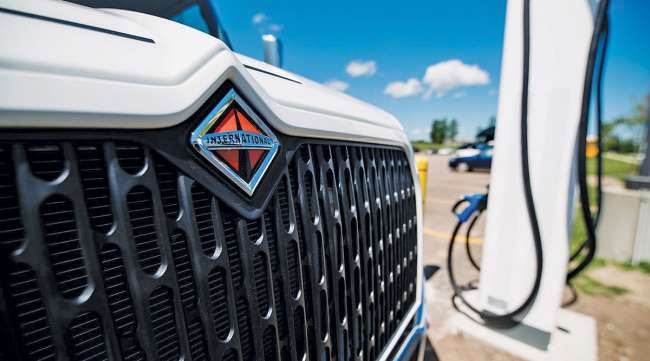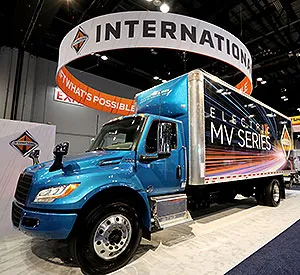Staff Reporter
Navistar Sustainability Push Gathers Steam

[Stay on top of transportation news: Get TTNews in your inbox.]
Navistar’s sustainability commitments go back more than 20 years, but in 2023, it has sharpened its focus.
“I cannot think of a more transformative time,” said Tobias Glitterstam, chief strategy and transformation officer of Navistar, the parent company of original equipment manufacturer International Trucks. “The truck industry is a late adopter. We want to change that.”
The company is improving its own impact on the environment and helping others to do the same, tasks that fall under Glitterstam’s purview. The former Swedish trade commissioner to the U.S. is responsible for Navistar’s sustainability initiatives as well as a team seeking opportunities in zero-emission transportation.
Since Glitterstam took up his position in January, Navistar has introduced a sustainability code of conduct for all suppliers. The Traton Group subsidiary’s requirements comprise respecting human rights, protecting the environment, conducting business ethically and lawfully, and the responsible sourcing of raw materials.
“We evaluate every supplier, and every supplier is given a sustainability score,” Glitterstam told Transport Topics, and Navistar requires its dealers to meet the same standards.

Glitterstam
Such efforts underpin the 10 human rights, labor, environment and anti-corruption principles that drive the United Nations Global Compact initiative, which Navistar signed up for in September. The initiative was launched in 2000 and currently has 13,000 corporate participants.
When asked why Navistar joined the initiative, Glitterstam said the question is not why now, the question should be why Navistar did not join earlier. “We take seriously our mission to navigate sustainable transportation,” he said. The compact is very well aligned with our vision, he added.
A deepening of the company’s environmental custodianship was made public in June, when Navistar CEO Mathias Carlbaum committed to developing science-based targets for the company aligned with Science Based Targets initiative criteria and submitting the targets for validation.

Carlbaum
The overall ambition of the SBTi targets is to cut in half world emissions before 2030 and achieve net-zero emissions before 2050, in alignment with the Paris Agreement.
Navistar is also committed to helping others’ sustainability initiatives.
On Nov. 28, the company announced eight three-year environmental equity funding programs (coinciding with GivingTuesday, the global initiative that encourages people to donate their time and money to charitable causes).
The awardees are: Eco-Friendly Mobile Farm Stand Project; Friends of the Forest Preserve of DuPage County; Fundación Universidad Autónoma de Nuevo León, A.C.; National Audubon Society; Urban Growers Collective; Up With Trees; San Antonio River Foundation; and the Land Trust of North Alabama.
To celebrate Giving Tuesday and as a part of our commitment to strategic, intentional efforts that positively impact our workplace, communities, and the world, we are eager to announce the inaugural award recipients for our environmental equity programs.https://t.co/ghNKwBmZoj — Navistar Newsroom (@NavistarNews) November 28, 2023
The projects will support conservation education programs, increase tree canopies in high need areas, support urban farming to reduce food insecurity and contribute to innovative approaches to carbon capture in public spaces, Navistar said.
Reforestation was already part of Navistar’s work. The company has set up reforestation programs for all its manufacturing plants, Glitterstam told TT in October.
Rishi Mehra of Trimble sheds light on the immense support that transportation technology can provide to enhance the efficiency of the physical supply chain. Tune in above or by going to RoadSigns.ttnews.com.
Navistar’s environmental stewardship in its physical locations also includes a biodiversity conservation project for the Escobedo plant in Mexico.
Between 2019 and 2023, the municipality of General Escobedo saw the introduction of native trees and the installation of pollinator gardens, which led to a tripling of the number of bird species within the plant boundaries, according to the company.
The output of Navistar’s plants is also becoming cleaner, including through the introduction of Traton’s common base engine.
One version of that is the S13 engine, part of the International S13 powertrain that began serial production Oct. 18 at the company’s Huntsville, Ala., production facility.
Our Huntsville plant has doubled its manufacturing capacity from one line to two as we have officially begun rolling out the @IntnlTrucks S13 Integrated Powertrain. Our S13 is expected to help customers bridge the gap between ICE and zero emission vehicleshttps://t.co/HIu3HRn81G — Navistar Newsroom (@NavistarNews) November 3, 2023
The powertrain — comprising the S13 engine, proprietary T14 automated transmission and a dual-stage aftertreatment system — is the final internal combustion engine platform Navistar plans to develop as Traton gears up for a future consisting solely of zero-emission vehicles.
Navistar expects 50% of new sales in the United States to be zero-emission vehicles by 2030 and 100% by 2040. “Every vehicle has the potential to be zero emissions,” Glitterstam said.
Many of those vehicles will roll out of the company’s San Antonio plant. Opened in 2022, the $250 million facility builds Class 6 through Class 8 diesel and electric vehicles.

An International eMV truck at a 2023 industry show. (John Sommers II for Transport Topics)
San Antonio is seen as the benchmark for other Navistar manufacturing facilities in terms of the company’s lean manufacturing principles to eliminate waste, improve product quality, drive operational efficiency, and reduce cost and time.
Perhaps not coincidentally, the first truck off the San Antonio assembly line on Jan. 25, 2022, was an electric International eMV.
In the long term, Navistar plans to source batteries for the eMV and the battery-electric portfolio of International’s sister company, IC Bus, in North America as well as bringing on board battery partners that will source raw materials in North America, Glitterstam said.
Meanwhile, the company is starting to design its vehicles with recycling in mind, Glitterstam said, adding that the company will make its decisions on battery technology based on recyclability. “We think about our customers’ customers,” he said.
Want more news? Listen to today's daily briefing below or go here for more info:





